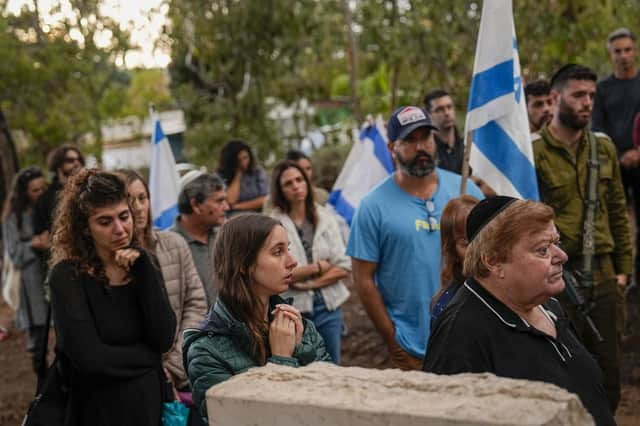Ian Ellis: We cannot lose all hope of peace in the Middle East otherwise the deadly quagmire will simply remain


On that day, Hamas terrorists crossed from the Gaza Strip into Israel and engaged in a savage campaign of murder. They committed unspeakable acts of violence. They also took over two hundred hostages.
Israel was swift to retaliate with an unfolding offensive, involving massive air strikes and a land invasion.
Advertisement
Hide AdAdvertisement
Hide AdThe military action, combined with the peril in which Hamas has placed Gazan civilians, and a dire shortage of food, water, medicines and fuel, all have brought about what the UN has described as a “political and humanitarian catastrophe of epic proportions”.
It may be recalled that the Bible records how, following the circa 1200BC biblical exodus from Egypt and a period of wandering in the wilderness, the Israelites settled in Canaan, the promised land.
The accounts in the books of Joshua and Judges present different perspectives on the settlement.
Interestingly, over the last century, and in light of archaeological investigations, biblical scholarly opinion has shifted from favouring a military-style subjugation towards a settlement that was less by force.
Advertisement
Hide AdAdvertisement
Hide AdWriting in the book, “Ancient Israel” (4th ed., 2021), Professor Gary Rendsburg, of Rutgers University, USA, has aptly pointed out that the area in question “was largely open terrain, with a very small population prior to the arrival of the Israelites”.
However, he nonetheless views occasional skirmishing and battles, such as at Jericho and Ai, as having been part of the process.
Wars of one kind or another in the region recurred throughout biblical times and at the time of Jesus, of course, it was under the Roman Empire.
Then, in the seventh century, Islam was born and it grew rapidly, through both missionary and military outreach. By 636AD a Muslim force had conquered Jerusalem.
Advertisement
Hide AdAdvertisement
Hide AdThe city is thus of very long-standing and sacred importance to Jews, Christians and Muslims.
Palestine was occupied by the Ottoman, or Turkish, empire in 1516, but that empire collapsed at the end of the First World War.
In 1922, the League of Nations, later the UN, endorsed the British mandate over Palestine to form a national homeland for the Jewish people, but the Palestinian Arabs, who were the majority of the population, remained opposed to the development.
In 1947, the UN recommended the creation of separate Jewish and Arab states, with Jerusalem under UN trusteeship, but this plan was also rejected by the Palestinian Arabs.
Advertisement
Hide AdAdvertisement
Hide AdThe situation became intractable and the UK withdrew in 1948, with Israel declaring its independence.
In an immediately ensuing war, according to the New York-based Council on Foreign Relations, at least 700,000 Palestinians were displaced from their homes. This is known as al-Nakba, or “the Catastrophe”, although many Israelis dispute the details.
The conflict has continued, despite repeated peace efforts, leading now to what the BBC's highly regarded chief international correspondent, Lyse Doucet, has described as one of “deep anger and agony on all sides”.
What I referred to as the “seemingly endless conflict” does indeed go back a very long way and while a two-state solution has long been widely advocated, it has been an elusive goal.
Advertisement
Hide AdAdvertisement
Hide AdThe creation of a new single state which would be home to both Jews and Palestinians has also been advocated, as has been a confederation, but these also have not progressed.
It was significant that President Biden, on his visit to Israel shortly after the October 7th Hamas outrage, both voiced Israel's right to defend itself and at the same time warned Israel: “After 9/11, we were enraged in the United States. And while we sought justice and got justice, we also made mistakes.”
It was a call to Israel to exercise caution.
Church leaders in Jerusalem issued a statement on the day after the October 7th attacks. They said: “Our faith, which is founded on the teachings of Jesus Christ, compels us to advocate for the cessation of all violent and military activities that bring harm to both Palestinian and Israeli civilians.”
They went on to “implore political leaders and authorities to engage in sincere dialogue, seeking lasting solutions that promote justice, peace and reconciliation for the people of this land, who have endured the burdens of conflict for far too long”.
Advertisement
Hide AdAdvertisement
Hide AdThey said they prayed that God would grant “comfort to the afflicted, strength to the weary, and wisdom to those in positions of authority”.
In current circumstances, any thoughts of a cessation of violence and military action and the opening of committed dialogue seem a forlorn hope, but the language of hope and peace must never be expunged.
As we know from our own experience of terrorism in Northern Ireland, for it to go away, at least to a very large extent, requires much more than military action. It also requires consensus among the people as to the way forward.
Getting all of that together in the Middle East will be an immense challenge. However, one cannot lose all hope that, one day, a better way forward for all can be found, because if hope is surrendered, motivation is lost and the deadly quagmire simply remains.
l Canon Ian Ellis is a former editor of The Church of Ireland Gazette.